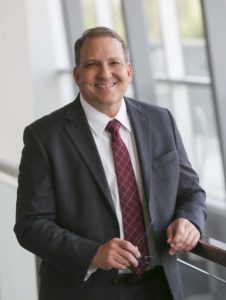Welcome from the Dean
J. Michael Mathis, Ph.D., Ed.D.
Professor and Dean, GSBS
Contact Dean
Dean’s Bio
The School of Biomedical Sciences (SBS) at the University of North Texas Health Science Center at Fort Worth (HSC), which celebrated its 25th anniversary in 2018, is proud of its prominent role in shaping the future of the biomedical workforce.
Our talented faculty not only provide high quality education and training to prepare our PhD, MS and BS students to become the educators, researchers and professionals of tomorrow. They also are engaged in ground-breaking research to tackle such major health issues as cancer, cardiovascular disease, infectious disease and Alzheimer’s disease.
Our curriculum is individual development plan (IDP)-driven and competency-based. It provides students with a broad foundation of knowledge in the biomedical sciences and promotes a team approach to solving complex problems that we believe is essential to better understand the biological principles that govern health and disease. It also affords students a set of transferable and marketable skills that allow them to embark on various biomedical science-related career paths.
The School is divided into three academic departments: Department of Physiology & Anatomy, the Department of Microbiology, Immunology & Genetics, and the Department of Pharmacology & Neuroscience. The graduate programs encompass the following areas: Medical Sciences, Clinical Research Management, Biotechnology, Forensic Sciences, Biochemistry and Cancer Biology, Cell Biology, Immunology, and Microbiology, Integrative Physiology, Molecular genetics, Pharmaceutical Sciences and Pharmacotherapy, Pharmacology and Neuroscience, Structural Anatomy and Rehabilitation Sciences, and Visual Sciences.
Research is one of the three focus areas – along with education and student services – identified by the School as of primary importance.
SBS researchers are conducting ground-breaking studies in a range of important medical issues. They are working on a blood test that can easily determine older adults’ risk for Alzheimer’s disease, and they are investigating dementia among Mexican Americans in order to develop targeted therapies based on ethnicity.
Our scientists are finding new ways to prevent heart failure, hypertension, strokes and other cardiovascular diseases. Using nanotechnology, they are closing in on ways to bypass normal cells and deliver chemotherapy directly to the tumor with fewer side effects.
Our experts hope to prevent vision loss by better understanding the mechanism of glaucoma and macular degeneration. And they lead the world in investigative genetics, helping solve crimes, combat human trafficking and identify human remains.
The successes of the School of Biomedical Science at HSC are a testament to our faculty, staff, students and alumni. We recognize that many challenges in biomedicine lie ahead, and we remain committed to the process of scientific inquiry and discovery as we journey toward a healthier tomorrow.



Social media